☆ PuniPuni Youtube ☆
Japanese Grammar: Verbs “imasu” and “arimasu” – Review Notes
Today we learned two ways to show existence in Japanese using the verbs arimasu (for non-living things) and imasu (for living things). But what about dead things, robots, and plants?!? Do they use arimasu or imasu?! Read more to find out!
………………………………………………………………………………..
Showing existence using Arimasu or Imasu:
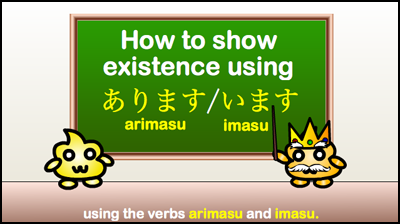
★ The Japanese verbs arimasu and imasu both translate to “there is” in English.
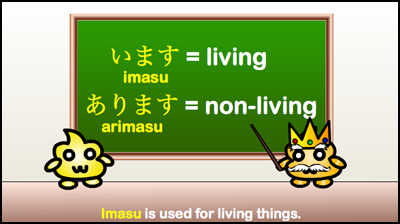
★ Generally, Imasu is used for living things and arimasu is used for everything else.
…………………………………………………………………………………
Example 1: Imasu
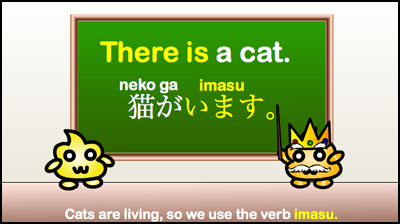
猫がいます。
Neko ga imasu
There is a cat.
★ Cats are living creatures, so we use the verb imasu.
★ When using the verbs imasu or arimasu to show existence, we use the subject particle “ga” between the noun (neko) and the verb (imasu).
.………………………………………………………………………………..
Example 2: Imasu
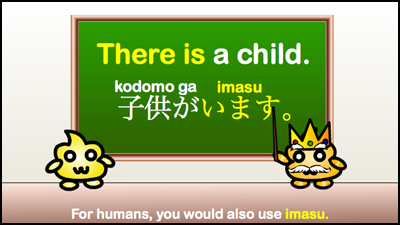
子供がいます。
Kodomo ga imasu
There is a child.

★ Children are also living, so we use the verb imasu.
…………………………………………………………………………………
Example 1: Arimasu
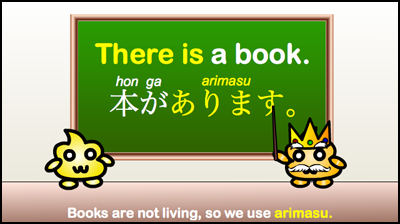
本があります。
Hon ga arimasu
There is a book.
★ Books are not living, so we use the verb arimasu.
…………………………………………………………………………………
Example 2: Arimasu

かばんがあります。
Kaban ga arimasu
There is a bag.
★ A bag is not living, so we use the verb arimasu.
…………………………………………………………………………………
EXCEPTIONS:
★ We mentioned that there are a few exceptions or surprising cases.
…………………………………………………………………………………
★ For dead people/animals, you use arimasu. The word for dead body in Japanese is 死体 (shitai). So you would say:
死体があります。
Shitai ga arimasu.
There is a dead body.
I hope you never have to say that (>ω<);
…………………………………………………………………………………
★ For robots, you use imasu even though they are not really living.
ロボットがいます。
Robotto ga imasu.
There is a robot.
…………………………………………………………………………………
★ For plants, you use arimasu even though they are actually living.
木があります。
Ki ga arimasu.
There is a tree.
………………………………………………………………………………..
Last Note:
★ Depending on the context, arimasu can also be used to indicate possession. For example:
宿題があります。
Shukudai ga arimasu.
There is homework. / I have homework.
………………………………………………………………………………..
Conclusion:
Today we learned how to use the Japanese verbs arimasu and imasu. Basically, imasu is for living things and arimasu is for other things, but there are some exceptions or surprises as we saw.
I hope you enjoyed today’s lesson! If you have any questions, leave a comment below (◕ω◕)♪
………………………………………………………………………………..
Get Japanese dictionary!
Do you want to know a lot of Japanese words? I recommend you to get a dictionary!
If you have dictionary, you can always look up new Japanese words\(◕ω◕)/♥
………………………………………………………………………………..
Do you want a Japanese tutor?
Take Japanese Skype Lessons with Professional Japanese Teachers on kakehashijapan.com!
………………………………………………………………………………..
………………………………………………………………………………..













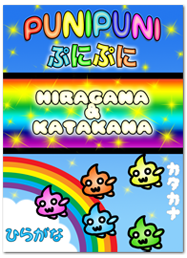
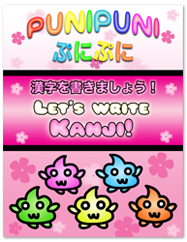


8 comments
when do we have to use particle ‘が’ in a sentence?
Comment by ichiro on 12/02/2012 at 11:07 amThere are actually a lot of times that you have to use が. We will make a video about the particle が pretty soon! Until then, if you want to know more about the particle が, maybe you can try this website! \(◕ω◕)/♥ http://japanese.about.com/library/weekly/aa051301a.htm
Comment by PuniPuni on 12/02/2012 at 12:13 pmKonnichiwa Puni Puni! I have a question. If I wanted to say.. There is a dead cat. Would that be Neko wa Shitai ga arimasu?
Comment by Amy on 06/09/2014 at 6:07 pmI hope you never have to use it, but you can say: “neko no shitai ga aru” (TωT)
Comment by PuniPuni on 06/21/2014 at 6:20 amKon’nichiwa Puni Puni!
Comment by David on 08/17/2014 at 6:45 amI have a quastion.
Robotto ga imasu, means; there is a robot. Am I right if I say that it also means; I have a robot?
Hello David! It makes sense that you would conclude that, because you can say things like 彼女がいます (kanojo ga imasu – “I have a girlfriend.”) but actually for robots it is better to say 私はロボットを持っています (watashi wa robotto o motteimasu) because although we use “imasu” for a robot like it is a living thing, it is actually an object or possession. Maybe someday when everyone has their own robot in their house and they are like humans, people might start to say “robotto ga imasu” meaning “I have a robot.” But, for now you should maybe stick to the verb “motteimasu” for robot possession. (>ω<;)
Comment by PuniPuni on 08/21/2014 at 8:12 amwhat about… 雨が降って います if I were to put 外 or any position in the sentence would that change?
Comment by me on 09/26/2014 at 4:22 amYou mean if you wanted to specifically say it is raining outside? You could say 外で雨が降っています。(It is raining outside).
Comment by PuniPuni on 10/03/2014 at 11:24 pm